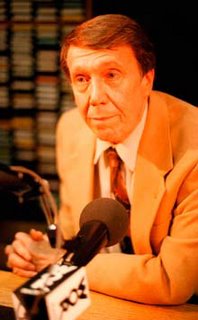Big Change In New York City
END OF AN ERA
Bob Grant Let Go At New York's WOR
Even though it's Rush Limbaugh who correctly gets credit for revolutionizing talk radio, several others first laid the foundation for the medium's eventual societal impact.
 One of those key players has been Bob Grant, a northeastern broadcast giant, who today was let go from New York's WOR 710 AM. The New York Post's John Mainelli has the scoop:
One of those key players has been Bob Grant, a northeastern broadcast giant, who today was let go from New York's WOR 710 AM. The New York Post's John Mainelli has the scoop:
While I've seen Grant speak at industry conventions, I'm not the expert on his legacy or real reasons behind his termination. However, two standout industry message board posts deserve consideration here. First, a slightly edited (for space) excerpt from Allan Sniffen at the New York Radio Board:
And, reflecting widespread industry sentiment, many in talk radio are questioning WOR's motives. Because the quality of much of the station's programming is notoriously terrible, criticism flows easily from the keypad.
from the keypad.
From Radio-Info.com:
Perhaps Grant will yet turn up somewhere else. Even if this turns out to be his last show, how many in the business could ever hope to leave behind this sort of legacy?
Why not get Christmas and other shopping done now and support the Radio Equalizer at the same time? Your Amazon orders that originate with clicks here, regardless of your final selections, help to support this work. Thanks again for your vital assistance!
Bob Grant Let Go At New York's WOR
Even though it's Rush Limbaugh who correctly gets credit for revolutionizing talk radio, several others first laid the foundation for the medium's eventual societal impact.
 One of those key players has been Bob Grant, a northeastern broadcast giant, who today was let go from New York's WOR 710 AM. The New York Post's John Mainelli has the scoop:
One of those key players has been Bob Grant, a northeastern broadcast giant, who today was let go from New York's WOR 710 AM. The New York Post's John Mainelli has the scoop:LEGENDARY talk-radio titan Bob Grant is leaving WOR next month by what is said to be a "mutual agreement," The Post has learned.
In a move sure to shock fans who made him New York's top-rated afternoon gabber for decades, Grant will do his last show of the year today, then take three weeks vacation and return for a final seven shows beginning Jan. 5.
The station had planned to announce his departure after his vacation. WOR (710 AM) will replace Grant with chef Rocco DiSpirito, who was the central figure in NBC's star-crossed reality show, "The Restaurant," and who currently does "Food Talk" in the late morning.
The move appears to be more about money than ratings.
Grant has WOR's highest share of daytime audience, and DiSpirito nearly the lowest, but food shows — like the other specialty shows WOR carries — fetch premium rates from sponsors who target specialized, if smaller, audiences.
While I've seen Grant speak at industry conventions, I'm not the expert on his legacy or real reasons behind his termination. However, two standout industry message board posts deserve consideration here. First, a slightly edited (for space) excerpt from Allan Sniffen at the New York Radio Board:
I don't think you can under-state Bob Grant's influence on listener participation political talk radio. When he arrived at WMCA (shortly after its format flip to "Dialogue Radio") he defined the station and the direction talk radio would go for the next thirty years.
Specifically:
1. The PACE of talk radio. Prior to Grant, most radio talk shows (with the possible exception of Long John Nebel and Joe Pyne) moved at a snail's pace. There were big long introductions and deep "exploration" of topics. It was boring for an audience that liked radio in sound bites. Grant would take call after call, cutting off anyone who dragged on. Even if you hated his current caller, you'd stay with him because you knew it would be over soon and someone else would be on.
2. Advocating a specific political philosophy. Prior to Grant, most talk radio hosts were neutral (or at least pretended to be). Grant came on with a swaggering bravado full of determination to prove he was right and those who disagreed were wrong. Nothing wishy-washy.
And this is key: even if you disagreed with him, you, as a listener, wanted to know what he was going to say about a news item. You didn't listen because you agreed, rather because you want to know what he was going to say and how he was going to say it.
3. Attitude. He was incredibly entertaining, in part, because he was more than willing to tell off callers. That played incredibly well in New York. I don't think Grant was ever syndication material because that approach irked a lot of out of town listeners. But here, in New York, it was great for an audience used to being told off by taxi drivers and construction workers.
Grant has an amazing legacy and his long lasting contributions to political talkradio will live on for years. WABC, WOR and WMCA would never have been the same without him.
And, reflecting widespread industry sentiment, many in talk radio are questioning WOR's motives. Because the quality of much of the station's programming is notoriously terrible, criticism flows easily
 from the keypad.
from the keypad.From Radio-Info.com:
This is not an indicator for the whole industry...
1. Grant is at the end of a long career. He's not a Hannity with years ahead of him.
2. WOR recently fired its program director. This move of the Food Show would seem to fit in with speculation that the Buckley heirs are about to sell.
Cut expenses, take short term profits where available. Taking off higher-rated programming in favor of lower-rated programming that brings in more bucks does work, but only in the short-term. It's like eating the seed corn. Ratings are the seed from which revenue grows.
3. There are a few anachronisms in the business that still do the style of talk that dominated before the mid-1980s. Some are successful (WCCO, WGN), others aren't (KDWN). WOR used to be in the former category but is rapidly heading toward the latter. Wouldn't be surprised to see real infomercials pop up on its air in prime daytime hours before the Buckleys cash in. Roex, anyone?
Perhaps Grant will yet turn up somewhere else. Even if this turns out to be his last show, how many in the business could ever hope to leave behind this sort of legacy?
Why not get Christmas and other shopping done now and support the Radio Equalizer at the same time? Your Amazon orders that originate with clicks here, regardless of your final selections, help to support this work. Thanks again for your vital assistance!



2 Comments:
Ratings don't mean a thing.
This is timed pretty well with Stern's leaving for Sirius.
The future is in directed broadcast, and terrestrial broadcast radio is coninually getting diluted to the point of being ripples on the pond.
By @whut, at 14 December, 2005 22:58
@whut, at 14 December, 2005 22:58
I never heard Grant but Boston talk legend Jerry Williams used to praise him, IIRC.
>>ood shows — like the other specialty shows WOR carries — fetch premium rates from sponsors who target specialized, if smaller, audiences.
In Boston they've just introduced a show called Taste of Boston Tonight on WRKO (they pushed Savage back and dropped Batchelor) which deals with cooking, dining, dating, lifestyle, etc. Sounds similar to what WOR--a sister station of 'RKO's in the RKO-General days--may be doing
By raccoonradio, at 15 December, 2005 13:55
raccoonradio, at 15 December, 2005 13:55
Post a Comment
<< Home